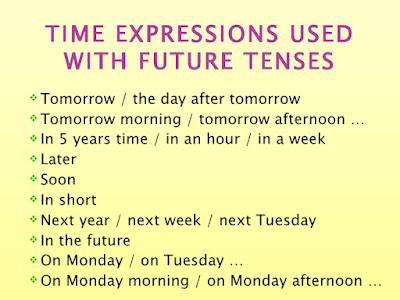Hi girls and boys of 7th grade. This week we begin the 3rd period of
classes, so this is the first topic.
Don't forget: Read well, look up the words you don't know in the dictionary and write the
information in your notebook.
The future
tense expresses a future event or a future state of being.
Simple
Future has two different forms in English: "will" and "be going
to" Although these two forms refer to a specific time in the future, they
often express two very different meanings.
Use of will Future
- a spontaneous decisionex: Wait, I will help you.
- an opinion, hope, uncertainty or assumption regarding the futureex: He will probably come back tomorrow.
- a promiseex: I will not watch TV tonight.
- an action in the future that cannot be influencedex: It will rain tomorrow.
- conditional clauses type Iex: If I arrive late, I will call you.
Signal Words
- in a year, next …, tomorrow
- Vermutung: I think, probably, perhaps







